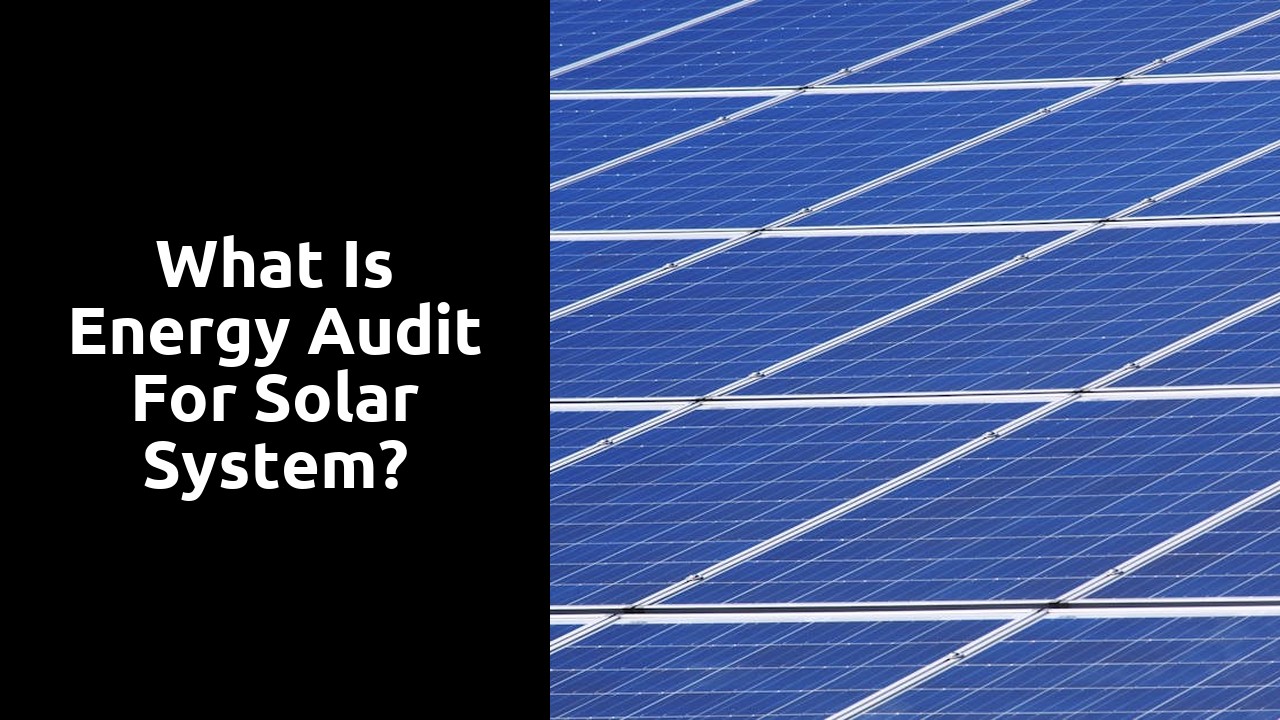
Table Of Contents
Role of Professional Auditors in Energy Efficiency
Professional auditors play a pivotal role in enhancing energy efficiency through their expertise in conducting thorough Solar Energy Audits. By meticulously examining the solar system's performance and energy usage, auditors can identify areas for improvement and recommend strategies to boost efficiency. Their objective assessment helps in pinpointing inefficiencies and potential issues that may impede the optimal functioning of the solar system.
Moreover, professional auditors ensure that solar systems are operating at their peak performance levels by detecting any malfunctions or discrepancies during the audit process. Their keen eye for detail and technical knowledge allow them to uncover hidden issues that could be undermining the system's efficiency. Through meticulous examination and analysis, auditors provide valuable insights to help solar system owners enhance their energy efficiency and reduce operational costs.
Providing Recommendations for Improvement
After conducting thorough Solar Energy Audits, professional auditors are equipped to provide valuable recommendations for improvement. These suggestions are vital in enhancing the efficiency and performance of solar systems. Recommendations may include upgrading components, implementing energy-saving measures, or adjusting system configurations to maximise energy production.
By following the recommendations provided after Solar Energy Audits, solar system owners can ensure that their systems operate at optimal levels. Implementing these improvements can lead to increased energy savings, reduced maintenance costs, and a longer lifespan for the solar system. It is crucial for system owners to take these recommendations seriously and act upon them promptly to reap the full benefits of their solar energy investment.
Common Findings from Solar System Audits
Solar Energy Audits play a crucial role in identifying various common issues in solar systems. One common finding during audits is the presence of shading on solar panels. Shading can significantly reduce the efficiency of the solar system by blocking sunlight, thereby affecting energy production. It is important for auditors to carefully assess and address shading issues to ensure optimal performance of the solar system.
In addition to shading, another common finding in Solar Energy Audits is the presence of dust and debris on solar panels. Accumulation of dirt can hinder the absorption of sunlight, resulting in decreased energy output. Regular cleaning and maintenance of solar panels are necessary to enhance the efficiency and longevity of the system. By identifying and addressing these common findings during audits, professionals can recommend solutions to improve the overall performance and energy production of solar systems.
Detecting Potential Issues and Malfunctions
During the process of conducting Solar Energy Audits, one crucial aspect is the detection of potential issues and malfunctions within the system. Identifying these issues early on can prevent further damage and inefficiencies in the solar system. Professional auditors are trained to carefully inspect all components of the system to pinpoint any areas of concern that may affect its performance.
Common issues that auditors look for include shading on solar panels, improper wiring connections, aging equipment, and potential damage from environmental factors. By conducting a thorough examination, auditors can recommend solutions to rectify these problems and ensure that the solar system operates optimally. Detecting these issues early allows for timely repairs and maintenance, ultimately prolonging the lifespan of the solar system and maximising its energy output.
Utilizing Audit Results for Optimizing Solar System
After conducting thorough Solar Energy Audits, the results obtained can serve as a valuable tool for optimizing the performance of a solar system. These audits provide detailed insights into the efficiency and functioning of the system, enabling users to make informed decisions for improvement. By utilising the audit findings, system owners can enhance the overall effectiveness and longevity of their solar energy systems.
Moreover, implementing the recommendations derived from the audit results can lead to significant cost savings and environmental benefits. Optimization strategies based on the audit outcomes can help in maximising energy production, reducing energy wastage, and minimising system downtime. Therefore, utilising the results of Solar Energy Audits is essential for achieving peak performance and efficiency from solar power systems.
Implementing Energy Saving Strategies
Once the results of the Solar Energy Audits are obtained, it is crucial to formulate and implement effective energy-saving strategies. These strategies are aimed at enhancing the overall efficiency and performance of the solar system. By carefully analysing the audit findings, recommendations can be tailored to suit the specific needs and requirements of the solar system.
Implementing energy-saving strategies involves a systematic approach to address any identified issues or areas for improvement. This may include adjustments to the system settings, upgrading equipment for better efficiency, or implementing operational changes to maximise energy output. By proactively implementing these strategies, solar system owners can not only reduce energy consumption but also prolong the life of their system.
FAQS
What is an energy audit for a solar system?
An energy audit for a solar system is a comprehensive assessment conducted by professional auditors to evaluate the efficiency and performance of the solar system in a property.
Why is it important to have an energy audit for a solar system?
Having an energy audit for a solar system helps in identifying any potential issues or malfunctions in the system, as well as providing recommendations for improvement to optimize energy efficiency and savings.
What role do professional auditors play in conducting an energy audit for a solar system?
Professional auditors have the expertise and experience to thoroughly assess the solar system, identify areas of improvement, and provide valuable insights on how to enhance the system's performance and efficiency.
What are some common findings that can be detected through a solar system audit?
Some common findings from a solar system audit include issues such as shading obstructions, suboptimal panel positioning, inefficient wiring, and malfunctioning components that may be affecting the system's overall efficiency.
How can the results of a solar system audit be utilized to optimize energy efficiency?
The results of a solar system audit can be used to implement energy-saving strategies, make necessary repairs or upgrades, adjust system settings, and adopt best practices to maximize the solar system's performance and energy output.
